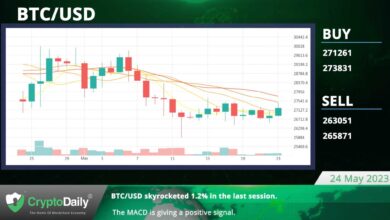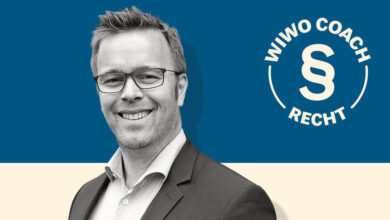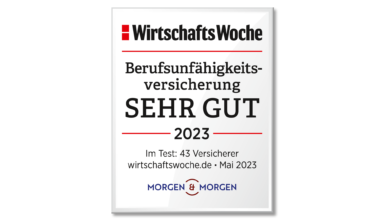Proper heating: heating down, mold up?
The appeals were omnipresent. “I ask everyone to make a contribution to saving energy now,” said Federal Minister of Economics Robert Habeck (Greens) a good year ago. “If you want to harm Putin a little bit, then you save energy,” it said elsewhere. Habeck was even more specific: “If you heat the apartment and draw the curtains in the evening, you save up to five percent of energy,” says Habeck, federal energy consultant in a part-time job. “And if you lower the room temperature by one degree, it’s around six percent. It might not be that comfortable, but you don’t get cold yet.”
Many have complied with the calls. Official statistics indicate that private households, for example, used 10 to 20 percent less gas than usual during most weeks of this heating season, in each case at comparable temperatures.
Turn down the heating: “Not a suitable savings method”
A savings success that apparently had side effects. “Unfortunately, this winter we had to deal with a disproportionate number of cases of mold growth in the apartments,” says the Berlin building and housing cooperative from 1892. It rents out almost 7,000 apartments in the capital. The cooperative attributes the increased mold infestation directly to the energy saving efforts. The heaters were turned down, the temperatures in the apartments were lowered.
“Lowering a few degrees is generally not a problem, but everything has to have limits. Not heating at all in combination with closed windows so that the residual heat does not escape is not a suitable method of saving,” the cooperative writes to its own residents in its member magazine.
It sounds like a lecture. And there are reasons for this: In the current heating period, 235 mold removals were commissioned, reports Thorsten Schmitt, chairman of the cooperative. That was an increase of 57 percent compared to the previous heating period. In purely mathematical terms, there was one such order for every 30th apartment in the portfolio. So far this winter, the cooperative has incurred costs of around 63,000 euros for mold removal.
An isolated case? Obviously not. For example, Hamburg’s largest landlord, the municipal housing company SAGA, reports a “slightly increased number of reported mold growth in apartments due to improper heating and ventilation behavior by tenants”.
SAGA has almost 140,000 apartments in its portfolio, almost exclusively in the Hanseatic city. According to the company, it has tried to avoid the foreseeable problem: a comprehensive information campaign was launched last summer. The caretakers and caretakers have been trained to become “energy consultants”. Energy should be saved, additional payments should be reduced and building damage and mold formation should be avoided.
Obviously that didn’t quite work out. Nevertheless, the landlord does not want to hold grudges: SAGA usually assumes the costs of mold removal as a gesture of goodwill if the tenants cooperate.
“The spare euphoria was very great”
John Bothe, managing director at real estate company Silberlake, is also observing an increase in mold problems. He manages around 1,000 of his own and 20,000 third-party apartments. He does not see any increasing mold problems in his own stock, but a general increase can be observed “in the course of energy saving efforts”. “If the temperature drops below 18 degrees, there is a sharp increase in the risk of mold,” says Bothe. “The spare euphoria was very high this year – unfortunately this is reflected in increased mold problems.”
However, some large landlords do not observe any such side effects of the energy saving efforts. Germany’s largest housing company Vonovia, with around 550,000 apartments, reports even significantly fewer reports of mold than in the previous heating period. According to Vonovia, this is “due to our comprehensive energy-related refurbishments and the overall good condition of our holdings, and on the other hand to our customer service”.
Home inspection tips
Anyone viewing a property should definitely do so in broad daylight. Then not only defects can be detected better, but also the overall lighting conditions can be assessed. If you want to know whether traffic noise or trades in the vicinity are annoying, you should visit on weekdays – before or after lunchtime.
A thorough property inspection takes time – and sellers and prospective buyers should take that too. Let each room work its magic on you, pay attention to details such as radiators, windows, doors and fittings. Let us show you everything in peace and then take a second tour. Then you will surely have open questions and you will get a more lasting impression.
It is also advisable to take a companion with you on a first visit. The four-eyes-principle makes every viewing appointment twice as productive, because everyone pays attention to different things. The risk of overlooking something essential is significantly lower.
If there are two people viewing a property, one person should definitely take photos of all the rooms and the outside. They help to reflect on what you have seen later and to clarify any details.
Make sure that they check your ideas and wishes on the property. A list of the most important criteria that the house should meet and a list of the most important questions that need to be clarified with the seller will help. Such lists simplify the viewing appointment considerably.
After the visit, ask for a building plan or a floor plan drawing together with a calculation of the living space, or make a photocopy of it. A digital photo of it will also do if necessary. Then you can calmly consider whether the room layout meets your requirements and whether the desired furniture would also find its place.
In the case of used properties in particular, you should examine the walls, windows, doors, roof structure and basement as closely as possible. If rot or moisture has made its way somewhere, renovation work can quickly become expensive. Watch out for possible mold growth in the corners of the room or behind furniture, also try out windows, shutters and doors. Also take a close look at the building services: How old is the boiler? What condition are the power and water lines in?
Anyone who sells a property must submit an energy performance certificate. A lot of real estate listings say it’s a work in progress. However, buyers should not do without it voluntarily, but rather insist on it. Only then does he get a comparative value for the energy hunger of a property, especially as far as the costly heating requirements are concerned. But beware: There are two variants, the requirement and the consumption card. The latter only provides information on how much energy the previous residents used on average over three years – and that depends on their individual heating behavior. The requirement certificate is only based on the building fabric and average weather and is more objective.
If the property is seriously considered after the first inspection, it is worth arranging another appointment with a building surveyor. This surveyor should be able to identify significant defects that are difficult to detect for the layperson and to estimate the necessary rehabilitation or defect removal costs. You can find suitable architects or civil engineers at Dekra (dekra.de), the Association of Private Builders (vpb.de), or the Federal Association of Freelance Experts (bvfs.de).
A property viewing should always include a walk through the neighborhood. In this way, you will be able to see how good the infrastructure is in the immediate vicinity, whether there is a source of noise that is disturbing you, and estimate the distances to shops, schools, or bus and train stops. Last but not least, the atmosphere in a residential area also plays an important role.
Here, too, there was specific information on correct heating and ventilation. One of the largest housing companies in North Rhine-Westphalia, Vivawest, with around 120,000 apartments, has “not noticed any noticeable changes”. Despite the increased energy prices, no more mold damage was reported.
To ensure that this also succeeds in the future with the apartments of the 1892, the cooperative is now trying to provide tips and information. Even a four-person household produces around twelve liters of humidity per day, for example through showering, washing and cooking. “This must be dissipated through regular and sufficient ventilation, otherwise it forms a breeding ground for mould,” writes the cooperative in its members’ magazine.
The rule of thumb is: always ventilate when the outside air is drier than the inside air. However, complete ventilation is not possible. Therefore, the heating behavior must also be right. “Otherwise the walls cool down too much and the moisture condenses on them.” Combining controlled heating and regular ventilation is ideal, “because fresh air heats up much better than stale air”.
Also read: This is how you reduce your personal energy consumption






